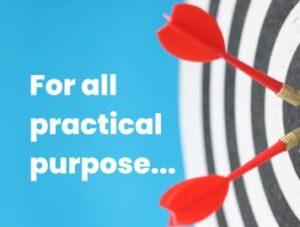Recently, a friend with the best intentions reached out. He needed help coming up with a list of possible career options for a mutual acquaintance who had gone through a major life transition and needed help getting back on their feet finding a job. “Here’s a list of their skills and things they like to do. Now give me some career suggestions for them”. My first instinct was to rush to prepare a list of suitable jobs. I’m sure all my readers would resonate with that. And then I stopped. As a life coach, I had a different approach.
Here’s a list of questions I asked them to pose instead:
- How did you arrive at conclusions about what they “like” to do?
- What do you think is NOT you at this point?
- What’s different in who they are / how they handle joy and adversity before and after their life impediment?
- What’s going to help them hang on by a thread when the going gets rough?
I’m am not quite sure if this was well-received or not by my friend and if they actually used the support. What I AM bringing out through this experience is the quintessential difference between seeking help from friends and family (undoubtedly seeking the best for you) and a life coach. Here are 3 ways in which the support may differ:
The perspective of support differs
A friend, in every case, wants to help. They’re in fix-it mode from the moment you say “I need advice/help” They want to tell you what to do, how to do it, and why you should do it that way. The “way” however, is their way. The solution is coming from their lens of the world. Nothing wrong with that. The question is – what’s going to support you in this particular context?
A coach comes from the same origin; a coach wants to help. Their support (and most newbie coaches like myself have struggled with this) should come from being able to look at your world through your lens. If you notice above, my retort to my friend was shaped in a question. A coach wants to know what resources they can manifest within you, of and by you, to support the way YOU see YOUR world.

The intention is different
A friend is being, well, a friend. They want you to be happy and feel good. A friend, even if they’re a trained coach, will find it very difficult to separate making you feel good from making you stay good. There’s a BIG DIFFERENCE between the two. For example, a friend may not be able to catch that when you are complaining about a current situation or seeking advice on a goal that you may be projecting your own deep-seated unfulfilled desires, which if unmet, may result in a continuous loop of the same challenges cropping up in your life.
Your coach is further intentioned to look for underlying beliefs, fears, and sabotaging patterns that may be holding you back or may potentially come in the way. That unlocked, there’s magic you can manifest to getting out of your own way. Sometimes, these conversations are hard to have. They’re nitty and gritty. Bring it on with your coach, they can take it. They’re here to see your best self, even when you cannot see it.
No holds barred
A conversation is such a fragile and yet, beautiful space created by two people. There’s an interplay of trust, concern and vulnerability created. Most of my clients would never think of being able to talk with their families and friends for fear of being judged or worst even, concerning our nearest and dearest. Also, even the most empathetic of my clients have told me that their friends were so busy giving them advice that they didn’t end up being felt and heard. This feeling, I will repeat, of being felt and heard is the bedrock of a good coaching conversation.
A coach understands that the power of the listening lies outside of themselves and trained coached undergo practice in how to “self regulate” i.e. how to manage your own judgment and hold space for your client so they can speak freely and access their deepest resources
Many of my clients have become friends over time. Many friends may have innate coaching abilities. There are no distinct lines that separate the two. It is however important when getting into a coaching relationship to acknowledge the distinction.








